Nursing Ethics: Applying NMBA & ICN Codes to Patient Care Scenarios
VerifiedAdded on 2023/06/11
|9
|2113
|176
Essay
AI Summary
This essay delves into the critical role of ethics in nursing, emphasizing the importance of adhering to the NMBA code of conduct and the ICN code of ethics. It examines key ethical principles such as autonomy, justice, beneficence, and non-maleficence, illustrating their application through the case study of an 87-year-old patient, Arnold Perara. The essay highlights how these principles guide nurses in making ethical decisions, ensuring patient rights, and promoting trust and transparency within healthcare organizations. It concludes that a strong ethical framework is essential for delivering high-quality care and maintaining the integrity of the nursing profession, advocating for the continuous development and implementation of ethical standards in healthcare settings.
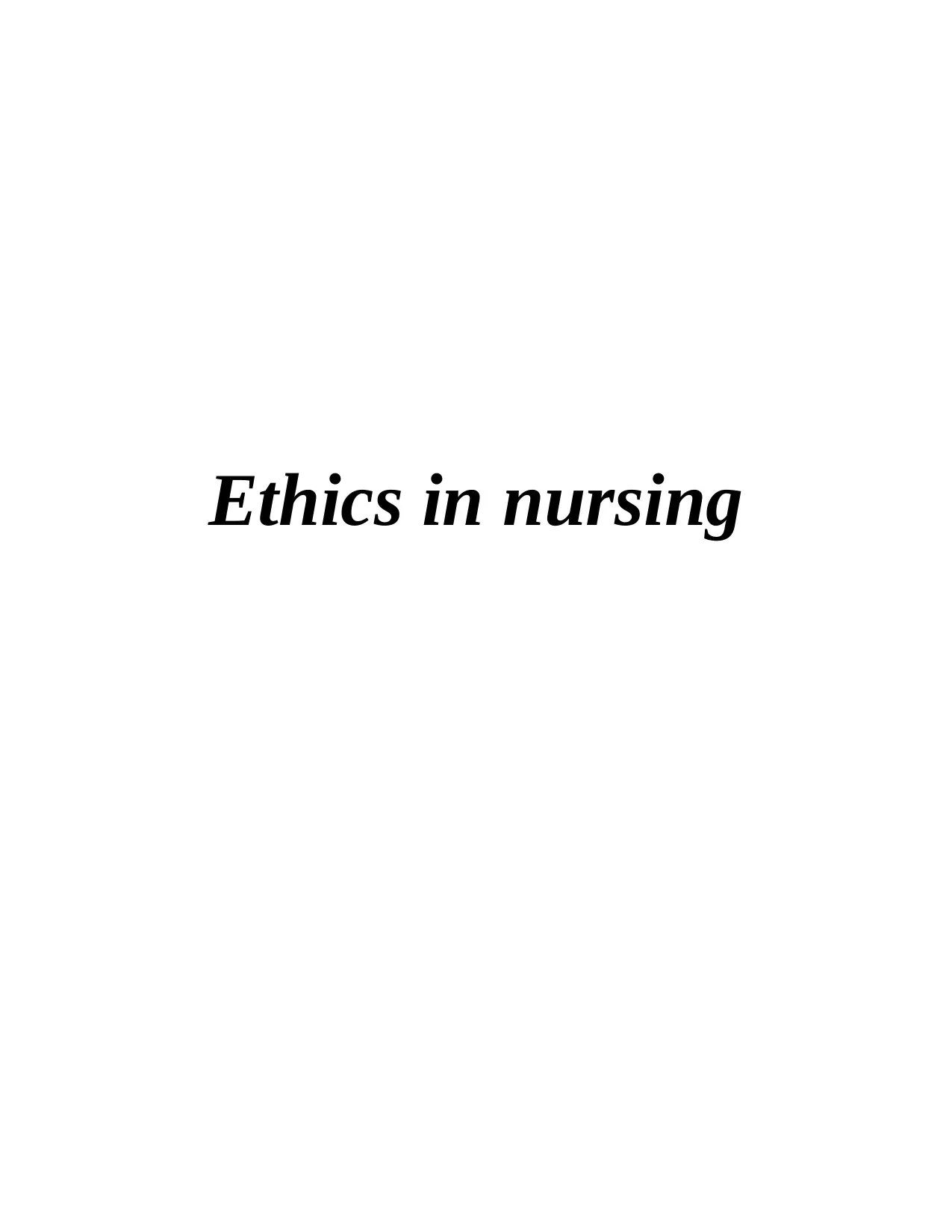
Ethics in nursing
Paraphrase This Document
Need a fresh take? Get an instant paraphrase of this document with our AI Paraphraser
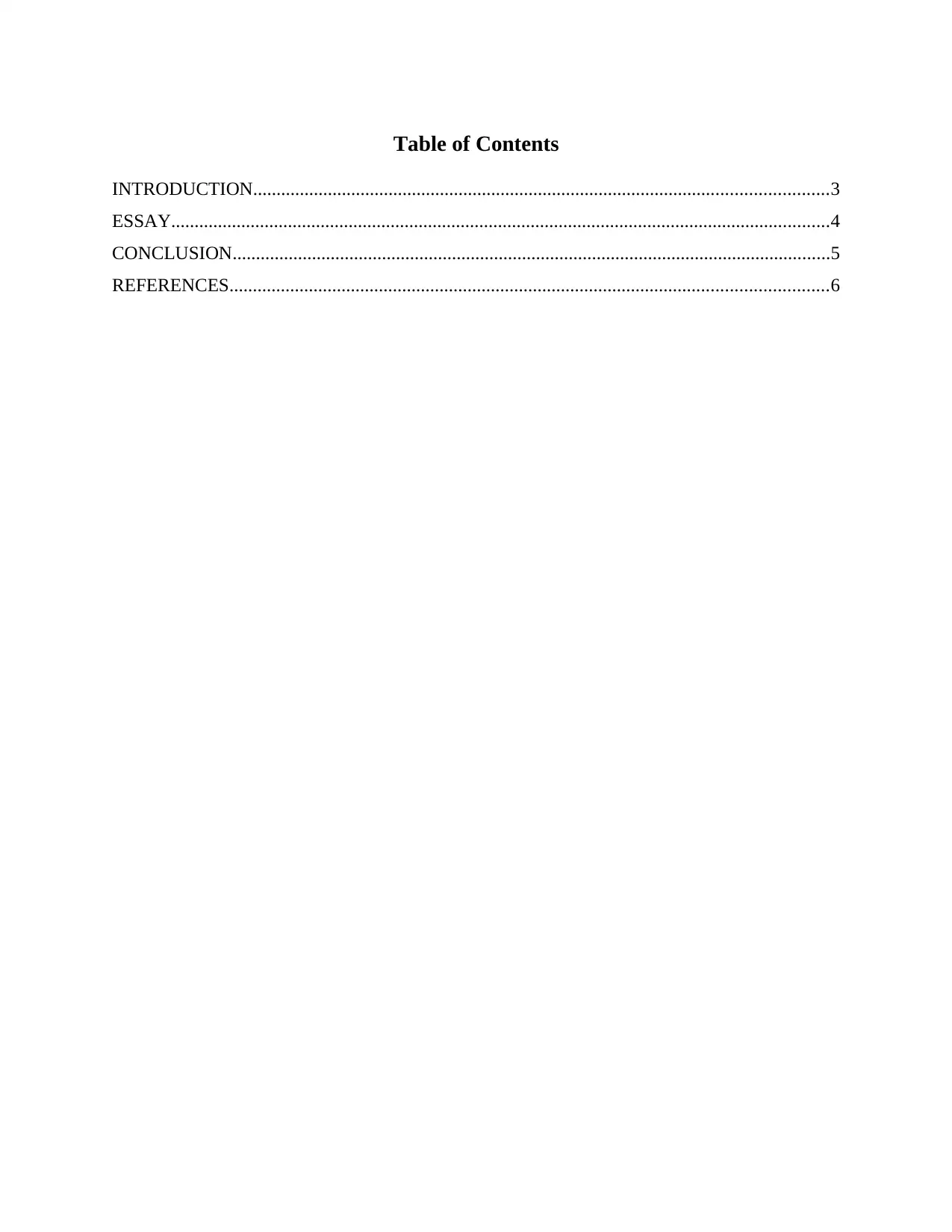
Table of Contents
INTRODUCTION...........................................................................................................................3
ESSAY.............................................................................................................................................4
CONCLUSION................................................................................................................................5
REFERENCES................................................................................................................................6
INTRODUCTION...........................................................................................................................3
ESSAY.............................................................................................................................................4
CONCLUSION................................................................................................................................5
REFERENCES................................................................................................................................6
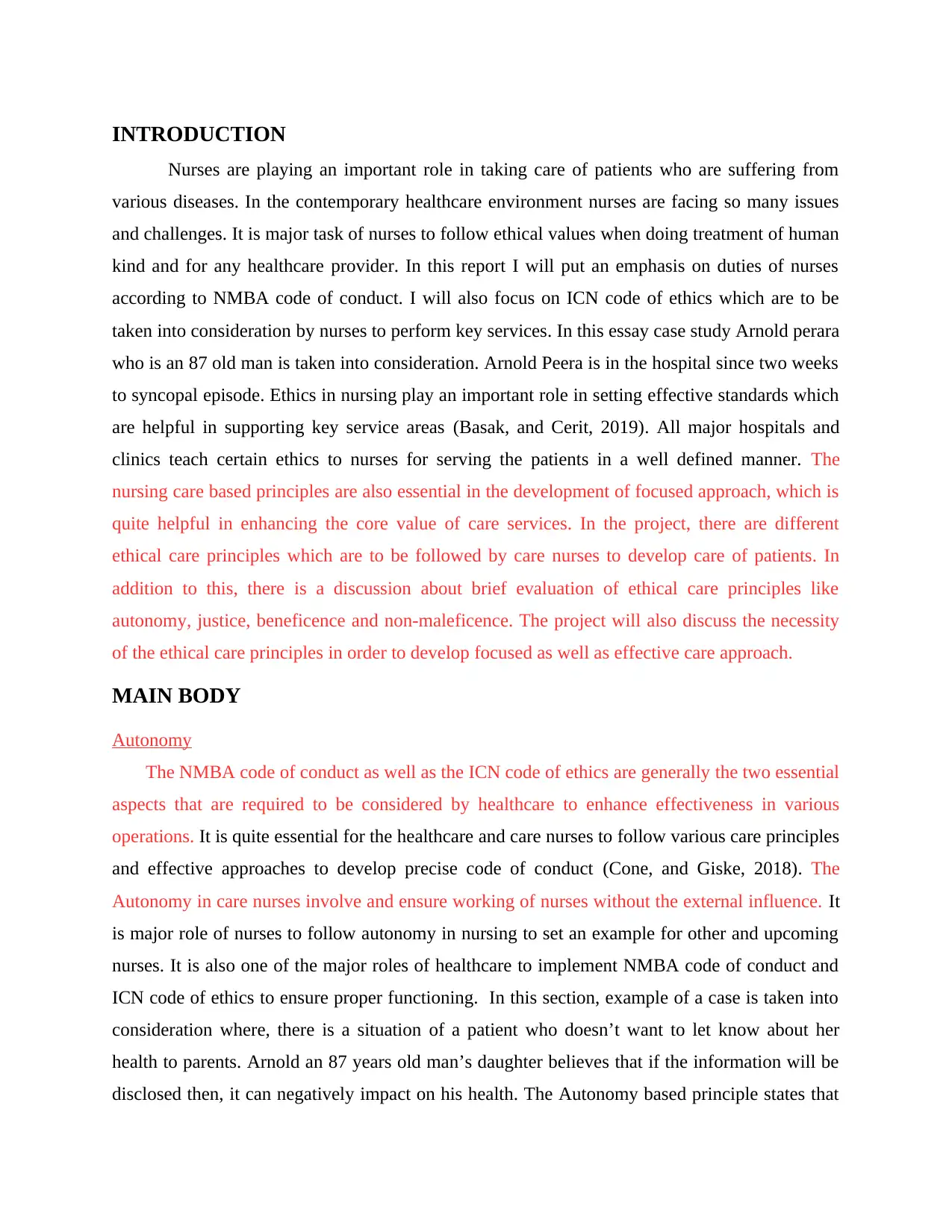
INTRODUCTION
Nurses are playing an important role in taking care of patients who are suffering from
various diseases. In the contemporary healthcare environment nurses are facing so many issues
and challenges. It is major task of nurses to follow ethical values when doing treatment of human
kind and for any healthcare provider. In this report I will put an emphasis on duties of nurses
according to NMBA code of conduct. I will also focus on ICN code of ethics which are to be
taken into consideration by nurses to perform key services. In this essay case study Arnold perara
who is an 87 old man is taken into consideration. Arnold Peera is in the hospital since two weeks
to syncopal episode. Ethics in nursing play an important role in setting effective standards which
are helpful in supporting key service areas (Basak, and Cerit, 2019). All major hospitals and
clinics teach certain ethics to nurses for serving the patients in a well defined manner. The
nursing care based principles are also essential in the development of focused approach, which is
quite helpful in enhancing the core value of care services. In the project, there are different
ethical care principles which are to be followed by care nurses to develop care of patients. In
addition to this, there is a discussion about brief evaluation of ethical care principles like
autonomy, justice, beneficence and non-maleficence. The project will also discuss the necessity
of the ethical care principles in order to develop focused as well as effective care approach.
MAIN BODY
Autonomy
The NMBA code of conduct as well as the ICN code of ethics are generally the two essential
aspects that are required to be considered by healthcare to enhance effectiveness in various
operations. It is quite essential for the healthcare and care nurses to follow various care principles
and effective approaches to develop precise code of conduct (Cone, and Giske, 2018). The
Autonomy in care nurses involve and ensure working of nurses without the external influence. It
is major role of nurses to follow autonomy in nursing to set an example for other and upcoming
nurses. It is also one of the major roles of healthcare to implement NMBA code of conduct and
ICN code of ethics to ensure proper functioning. In this section, example of a case is taken into
consideration where, there is a situation of a patient who doesn’t want to let know about her
health to parents. Arnold an 87 years old man’s daughter believes that if the information will be
disclosed then, it can negatively impact on his health. The Autonomy based principle states that
Nurses are playing an important role in taking care of patients who are suffering from
various diseases. In the contemporary healthcare environment nurses are facing so many issues
and challenges. It is major task of nurses to follow ethical values when doing treatment of human
kind and for any healthcare provider. In this report I will put an emphasis on duties of nurses
according to NMBA code of conduct. I will also focus on ICN code of ethics which are to be
taken into consideration by nurses to perform key services. In this essay case study Arnold perara
who is an 87 old man is taken into consideration. Arnold Peera is in the hospital since two weeks
to syncopal episode. Ethics in nursing play an important role in setting effective standards which
are helpful in supporting key service areas (Basak, and Cerit, 2019). All major hospitals and
clinics teach certain ethics to nurses for serving the patients in a well defined manner. The
nursing care based principles are also essential in the development of focused approach, which is
quite helpful in enhancing the core value of care services. In the project, there are different
ethical care principles which are to be followed by care nurses to develop care of patients. In
addition to this, there is a discussion about brief evaluation of ethical care principles like
autonomy, justice, beneficence and non-maleficence. The project will also discuss the necessity
of the ethical care principles in order to develop focused as well as effective care approach.
MAIN BODY
Autonomy
The NMBA code of conduct as well as the ICN code of ethics are generally the two essential
aspects that are required to be considered by healthcare to enhance effectiveness in various
operations. It is quite essential for the healthcare and care nurses to follow various care principles
and effective approaches to develop precise code of conduct (Cone, and Giske, 2018). The
Autonomy in care nurses involve and ensure working of nurses without the external influence. It
is major role of nurses to follow autonomy in nursing to set an example for other and upcoming
nurses. It is also one of the major roles of healthcare to implement NMBA code of conduct and
ICN code of ethics to ensure proper functioning. In this section, example of a case is taken into
consideration where, there is a situation of a patient who doesn’t want to let know about her
health to parents. Arnold an 87 years old man’s daughter believes that if the information will be
disclosed then, it can negatively impact on his health. The Autonomy based principle states that
⊘ This is a preview!⊘
Do you want full access?
Subscribe today to unlock all pages.

Trusted by 1+ million students worldwide
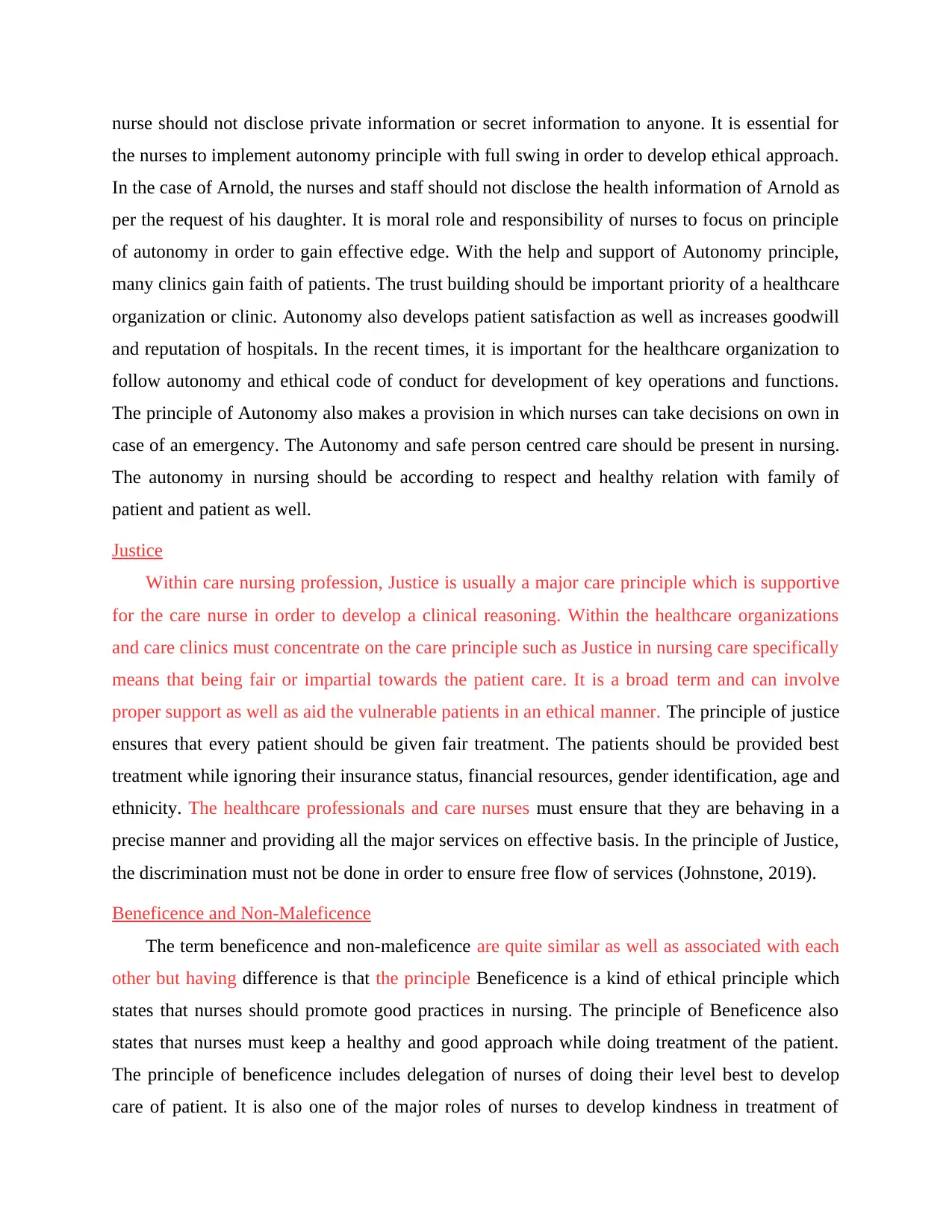
nurse should not disclose private information or secret information to anyone. It is essential for
the nurses to implement autonomy principle with full swing in order to develop ethical approach.
In the case of Arnold, the nurses and staff should not disclose the health information of Arnold as
per the request of his daughter. It is moral role and responsibility of nurses to focus on principle
of autonomy in order to gain effective edge. With the help and support of Autonomy principle,
many clinics gain faith of patients. The trust building should be important priority of a healthcare
organization or clinic. Autonomy also develops patient satisfaction as well as increases goodwill
and reputation of hospitals. In the recent times, it is important for the healthcare organization to
follow autonomy and ethical code of conduct for development of key operations and functions.
The principle of Autonomy also makes a provision in which nurses can take decisions on own in
case of an emergency. The Autonomy and safe person centred care should be present in nursing.
The autonomy in nursing should be according to respect and healthy relation with family of
patient and patient as well.
Justice
Within care nursing profession, Justice is usually a major care principle which is supportive
for the care nurse in order to develop a clinical reasoning. Within the healthcare organizations
and care clinics must concentrate on the care principle such as Justice in nursing care specifically
means that being fair or impartial towards the patient care. It is a broad term and can involve
proper support as well as aid the vulnerable patients in an ethical manner. The principle of justice
ensures that every patient should be given fair treatment. The patients should be provided best
treatment while ignoring their insurance status, financial resources, gender identification, age and
ethnicity. The healthcare professionals and care nurses must ensure that they are behaving in a
precise manner and providing all the major services on effective basis. In the principle of Justice,
the discrimination must not be done in order to ensure free flow of services (Johnstone, 2019).
Beneficence and Non-Maleficence
The term beneficence and non-maleficence are quite similar as well as associated with each
other but having difference is that the principle Beneficence is a kind of ethical principle which
states that nurses should promote good practices in nursing. The principle of Beneficence also
states that nurses must keep a healthy and good approach while doing treatment of the patient.
The principle of beneficence includes delegation of nurses of doing their level best to develop
care of patient. It is also one of the major roles of nurses to develop kindness in treatment of
the nurses to implement autonomy principle with full swing in order to develop ethical approach.
In the case of Arnold, the nurses and staff should not disclose the health information of Arnold as
per the request of his daughter. It is moral role and responsibility of nurses to focus on principle
of autonomy in order to gain effective edge. With the help and support of Autonomy principle,
many clinics gain faith of patients. The trust building should be important priority of a healthcare
organization or clinic. Autonomy also develops patient satisfaction as well as increases goodwill
and reputation of hospitals. In the recent times, it is important for the healthcare organization to
follow autonomy and ethical code of conduct for development of key operations and functions.
The principle of Autonomy also makes a provision in which nurses can take decisions on own in
case of an emergency. The Autonomy and safe person centred care should be present in nursing.
The autonomy in nursing should be according to respect and healthy relation with family of
patient and patient as well.
Justice
Within care nursing profession, Justice is usually a major care principle which is supportive
for the care nurse in order to develop a clinical reasoning. Within the healthcare organizations
and care clinics must concentrate on the care principle such as Justice in nursing care specifically
means that being fair or impartial towards the patient care. It is a broad term and can involve
proper support as well as aid the vulnerable patients in an ethical manner. The principle of justice
ensures that every patient should be given fair treatment. The patients should be provided best
treatment while ignoring their insurance status, financial resources, gender identification, age and
ethnicity. The healthcare professionals and care nurses must ensure that they are behaving in a
precise manner and providing all the major services on effective basis. In the principle of Justice,
the discrimination must not be done in order to ensure free flow of services (Johnstone, 2019).
Beneficence and Non-Maleficence
The term beneficence and non-maleficence are quite similar as well as associated with each
other but having difference is that the principle Beneficence is a kind of ethical principle which
states that nurses should promote good practices in nursing. The principle of Beneficence also
states that nurses must keep a healthy and good approach while doing treatment of the patient.
The principle of beneficence includes delegation of nurses of doing their level best to develop
care of patient. It is also one of the major roles of nurses to develop kindness in treatment of
Paraphrase This Document
Need a fresh take? Get an instant paraphrase of this document with our AI Paraphraser
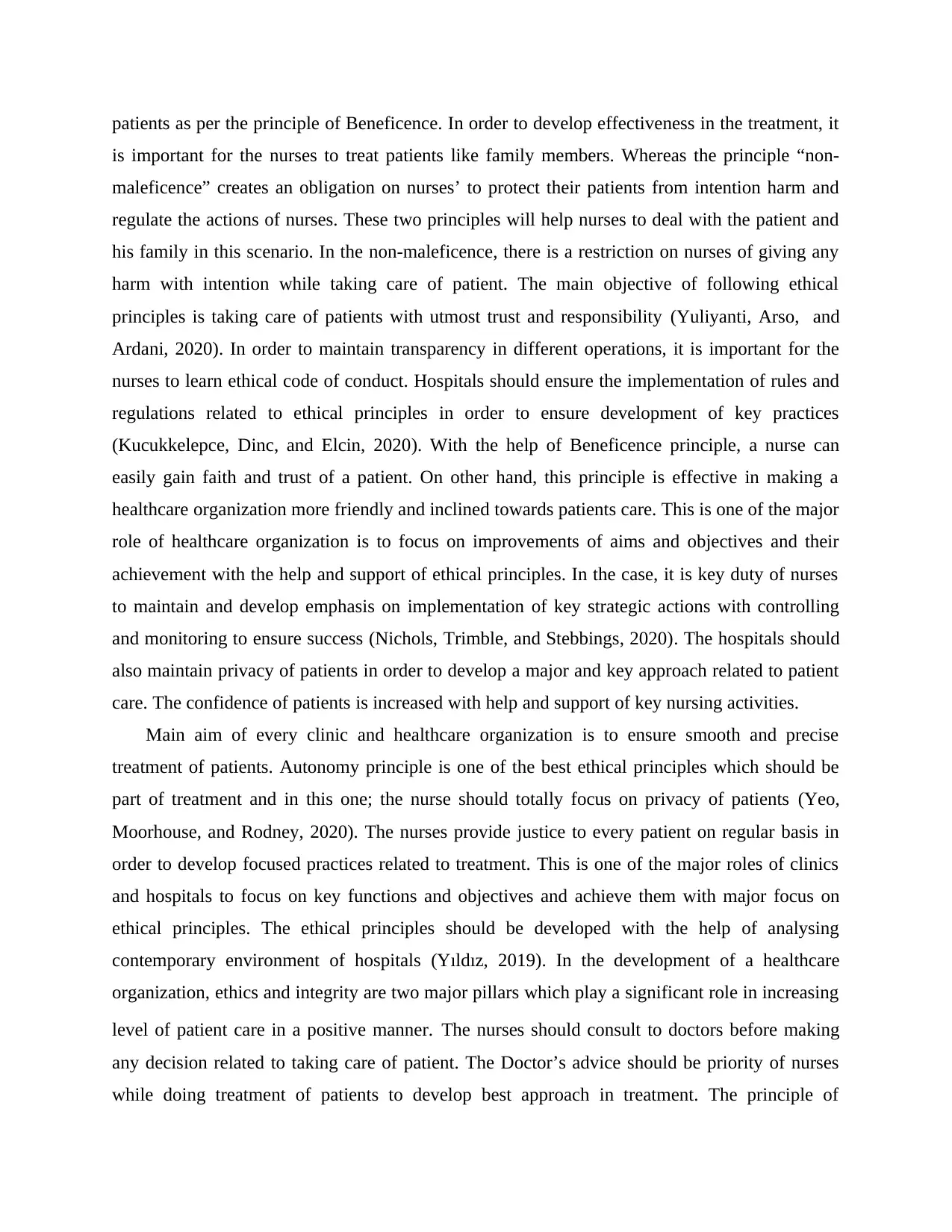
patients as per the principle of Beneficence. In order to develop effectiveness in the treatment, it
is important for the nurses to treat patients like family members. Whereas the principle “non-
maleficence” creates an obligation on nurses’ to protect their patients from intention harm and
regulate the actions of nurses. These two principles will help nurses to deal with the patient and
his family in this scenario. In the non-maleficence, there is a restriction on nurses of giving any
harm with intention while taking care of patient. The main objective of following ethical
principles is taking care of patients with utmost trust and responsibility (Yuliyanti, Arso, and
Ardani, 2020). In order to maintain transparency in different operations, it is important for the
nurses to learn ethical code of conduct. Hospitals should ensure the implementation of rules and
regulations related to ethical principles in order to ensure development of key practices
(Kucukkelepce, Dinc, and Elcin, 2020). With the help of Beneficence principle, a nurse can
easily gain faith and trust of a patient. On other hand, this principle is effective in making a
healthcare organization more friendly and inclined towards patients care. This is one of the major
role of healthcare organization is to focus on improvements of aims and objectives and their
achievement with the help and support of ethical principles. In the case, it is key duty of nurses
to maintain and develop emphasis on implementation of key strategic actions with controlling
and monitoring to ensure success (Nichols, Trimble, and Stebbings, 2020). The hospitals should
also maintain privacy of patients in order to develop a major and key approach related to patient
care. The confidence of patients is increased with help and support of key nursing activities.
Main aim of every clinic and healthcare organization is to ensure smooth and precise
treatment of patients. Autonomy principle is one of the best ethical principles which should be
part of treatment and in this one; the nurse should totally focus on privacy of patients (Yeo,
Moorhouse, and Rodney, 2020). The nurses provide justice to every patient on regular basis in
order to develop focused practices related to treatment. This is one of the major roles of clinics
and hospitals to focus on key functions and objectives and achieve them with major focus on
ethical principles. The ethical principles should be developed with the help of analysing
contemporary environment of hospitals (Yıldız, 2019). In the development of a healthcare
organization, ethics and integrity are two major pillars which play a significant role in increasing
level of patient care in a positive manner. The nurses should consult to doctors before making
any decision related to taking care of patient. The Doctor’s advice should be priority of nurses
while doing treatment of patients to develop best approach in treatment. The principle of
is important for the nurses to treat patients like family members. Whereas the principle “non-
maleficence” creates an obligation on nurses’ to protect their patients from intention harm and
regulate the actions of nurses. These two principles will help nurses to deal with the patient and
his family in this scenario. In the non-maleficence, there is a restriction on nurses of giving any
harm with intention while taking care of patient. The main objective of following ethical
principles is taking care of patients with utmost trust and responsibility (Yuliyanti, Arso, and
Ardani, 2020). In order to maintain transparency in different operations, it is important for the
nurses to learn ethical code of conduct. Hospitals should ensure the implementation of rules and
regulations related to ethical principles in order to ensure development of key practices
(Kucukkelepce, Dinc, and Elcin, 2020). With the help of Beneficence principle, a nurse can
easily gain faith and trust of a patient. On other hand, this principle is effective in making a
healthcare organization more friendly and inclined towards patients care. This is one of the major
role of healthcare organization is to focus on improvements of aims and objectives and their
achievement with the help and support of ethical principles. In the case, it is key duty of nurses
to maintain and develop emphasis on implementation of key strategic actions with controlling
and monitoring to ensure success (Nichols, Trimble, and Stebbings, 2020). The hospitals should
also maintain privacy of patients in order to develop a major and key approach related to patient
care. The confidence of patients is increased with help and support of key nursing activities.
Main aim of every clinic and healthcare organization is to ensure smooth and precise
treatment of patients. Autonomy principle is one of the best ethical principles which should be
part of treatment and in this one; the nurse should totally focus on privacy of patients (Yeo,
Moorhouse, and Rodney, 2020). The nurses provide justice to every patient on regular basis in
order to develop focused practices related to treatment. This is one of the major roles of clinics
and hospitals to focus on key functions and objectives and achieve them with major focus on
ethical principles. The ethical principles should be developed with the help of analysing
contemporary environment of hospitals (Yıldız, 2019). In the development of a healthcare
organization, ethics and integrity are two major pillars which play a significant role in increasing
level of patient care in a positive manner. The nurses should consult to doctors before making
any decision related to taking care of patient. The Doctor’s advice should be priority of nurses
while doing treatment of patients to develop best approach in treatment. The principle of
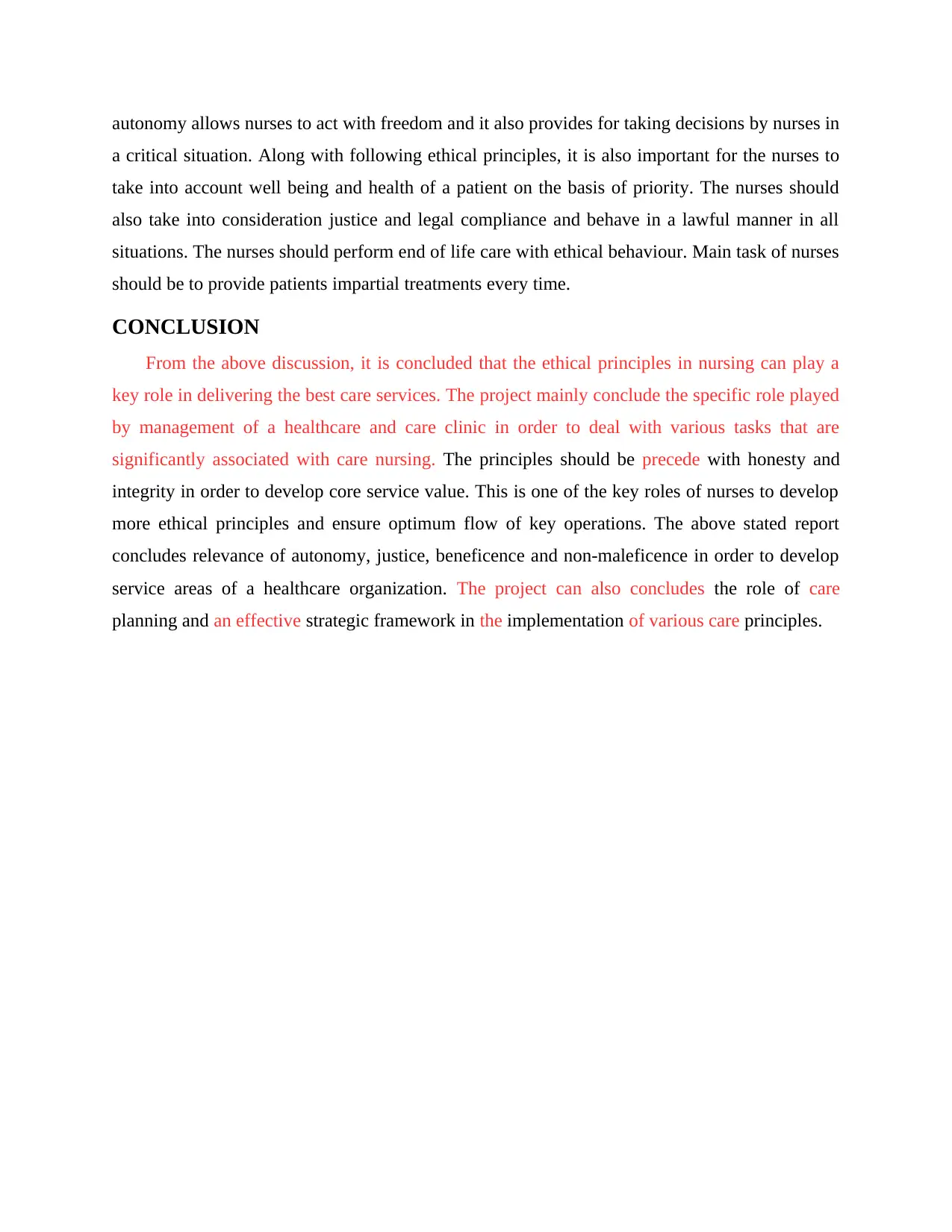
autonomy allows nurses to act with freedom and it also provides for taking decisions by nurses in
a critical situation. Along with following ethical principles, it is also important for the nurses to
take into account well being and health of a patient on the basis of priority. The nurses should
also take into consideration justice and legal compliance and behave in a lawful manner in all
situations. The nurses should perform end of life care with ethical behaviour. Main task of nurses
should be to provide patients impartial treatments every time.
CONCLUSION
From the above discussion, it is concluded that the ethical principles in nursing can play a
key role in delivering the best care services. The project mainly conclude the specific role played
by management of a healthcare and care clinic in order to deal with various tasks that are
significantly associated with care nursing. The principles should be precede with honesty and
integrity in order to develop core service value. This is one of the key roles of nurses to develop
more ethical principles and ensure optimum flow of key operations. The above stated report
concludes relevance of autonomy, justice, beneficence and non-maleficence in order to develop
service areas of a healthcare organization. The project can also concludes the role of care
planning and an effective strategic framework in the implementation of various care principles.
a critical situation. Along with following ethical principles, it is also important for the nurses to
take into account well being and health of a patient on the basis of priority. The nurses should
also take into consideration justice and legal compliance and behave in a lawful manner in all
situations. The nurses should perform end of life care with ethical behaviour. Main task of nurses
should be to provide patients impartial treatments every time.
CONCLUSION
From the above discussion, it is concluded that the ethical principles in nursing can play a
key role in delivering the best care services. The project mainly conclude the specific role played
by management of a healthcare and care clinic in order to deal with various tasks that are
significantly associated with care nursing. The principles should be precede with honesty and
integrity in order to develop core service value. This is one of the key roles of nurses to develop
more ethical principles and ensure optimum flow of key operations. The above stated report
concludes relevance of autonomy, justice, beneficence and non-maleficence in order to develop
service areas of a healthcare organization. The project can also concludes the role of care
planning and an effective strategic framework in the implementation of various care principles.
⊘ This is a preview!⊘
Do you want full access?
Subscribe today to unlock all pages.

Trusted by 1+ million students worldwide
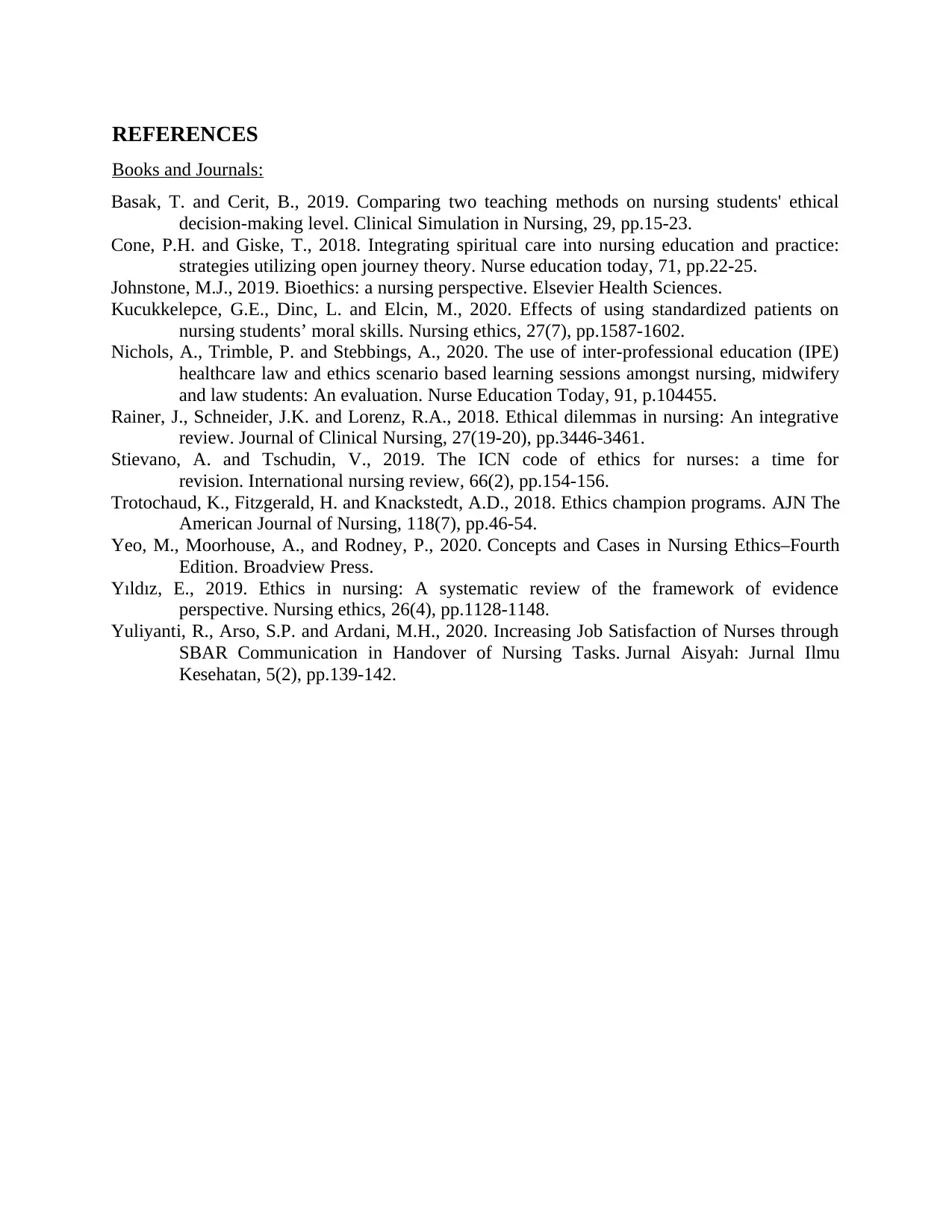
REFERENCES
Books and Journals:
Basak, T. and Cerit, B., 2019. Comparing two teaching methods on nursing students' ethical
decision-making level. Clinical Simulation in Nursing, 29, pp.15-23.
Cone, P.H. and Giske, T., 2018. Integrating spiritual care into nursing education and practice:
strategies utilizing open journey theory. Nurse education today, 71, pp.22-25.
Johnstone, M.J., 2019. Bioethics: a nursing perspective. Elsevier Health Sciences.
Kucukkelepce, G.E., Dinc, L. and Elcin, M., 2020. Effects of using standardized patients on
nursing students’ moral skills. Nursing ethics, 27(7), pp.1587-1602.
Nichols, A., Trimble, P. and Stebbings, A., 2020. The use of inter-professional education (IPE)
healthcare law and ethics scenario based learning sessions amongst nursing, midwifery
and law students: An evaluation. Nurse Education Today, 91, p.104455.
Rainer, J., Schneider, J.K. and Lorenz, R.A., 2018. Ethical dilemmas in nursing: An integrative
review. Journal of Clinical Nursing, 27(19-20), pp.3446-3461.
Stievano, A. and Tschudin, V., 2019. The ICN code of ethics for nurses: a time for
revision. International nursing review, 66(2), pp.154-156.
Trotochaud, K., Fitzgerald, H. and Knackstedt, A.D., 2018. Ethics champion programs. AJN The
American Journal of Nursing, 118(7), pp.46-54.
Yeo, M., Moorhouse, A., and Rodney, P., 2020. Concepts and Cases in Nursing Ethics–Fourth
Edition. Broadview Press.
Yıldız, E., 2019. Ethics in nursing: A systematic review of the framework of evidence
perspective. Nursing ethics, 26(4), pp.1128-1148.
Yuliyanti, R., Arso, S.P. and Ardani, M.H., 2020. Increasing Job Satisfaction of Nurses through
SBAR Communication in Handover of Nursing Tasks. Jurnal Aisyah: Jurnal Ilmu
Kesehatan, 5(2), pp.139-142.
Books and Journals:
Basak, T. and Cerit, B., 2019. Comparing two teaching methods on nursing students' ethical
decision-making level. Clinical Simulation in Nursing, 29, pp.15-23.
Cone, P.H. and Giske, T., 2018. Integrating spiritual care into nursing education and practice:
strategies utilizing open journey theory. Nurse education today, 71, pp.22-25.
Johnstone, M.J., 2019. Bioethics: a nursing perspective. Elsevier Health Sciences.
Kucukkelepce, G.E., Dinc, L. and Elcin, M., 2020. Effects of using standardized patients on
nursing students’ moral skills. Nursing ethics, 27(7), pp.1587-1602.
Nichols, A., Trimble, P. and Stebbings, A., 2020. The use of inter-professional education (IPE)
healthcare law and ethics scenario based learning sessions amongst nursing, midwifery
and law students: An evaluation. Nurse Education Today, 91, p.104455.
Rainer, J., Schneider, J.K. and Lorenz, R.A., 2018. Ethical dilemmas in nursing: An integrative
review. Journal of Clinical Nursing, 27(19-20), pp.3446-3461.
Stievano, A. and Tschudin, V., 2019. The ICN code of ethics for nurses: a time for
revision. International nursing review, 66(2), pp.154-156.
Trotochaud, K., Fitzgerald, H. and Knackstedt, A.D., 2018. Ethics champion programs. AJN The
American Journal of Nursing, 118(7), pp.46-54.
Yeo, M., Moorhouse, A., and Rodney, P., 2020. Concepts and Cases in Nursing Ethics–Fourth
Edition. Broadview Press.
Yıldız, E., 2019. Ethics in nursing: A systematic review of the framework of evidence
perspective. Nursing ethics, 26(4), pp.1128-1148.
Yuliyanti, R., Arso, S.P. and Ardani, M.H., 2020. Increasing Job Satisfaction of Nurses through
SBAR Communication in Handover of Nursing Tasks. Jurnal Aisyah: Jurnal Ilmu
Kesehatan, 5(2), pp.139-142.
Paraphrase This Document
Need a fresh take? Get an instant paraphrase of this document with our AI Paraphraser


⊘ This is a preview!⊘
Do you want full access?
Subscribe today to unlock all pages.

Trusted by 1+ million students worldwide
1 out of 9
Related Documents
Your All-in-One AI-Powered Toolkit for Academic Success.
+13062052269
info@desklib.com
Available 24*7 on WhatsApp / Email
![[object Object]](/_next/static/media/star-bottom.7253800d.svg)
Unlock your academic potential
Copyright © 2020–2026 A2Z Services. All Rights Reserved. Developed and managed by ZUCOL.




